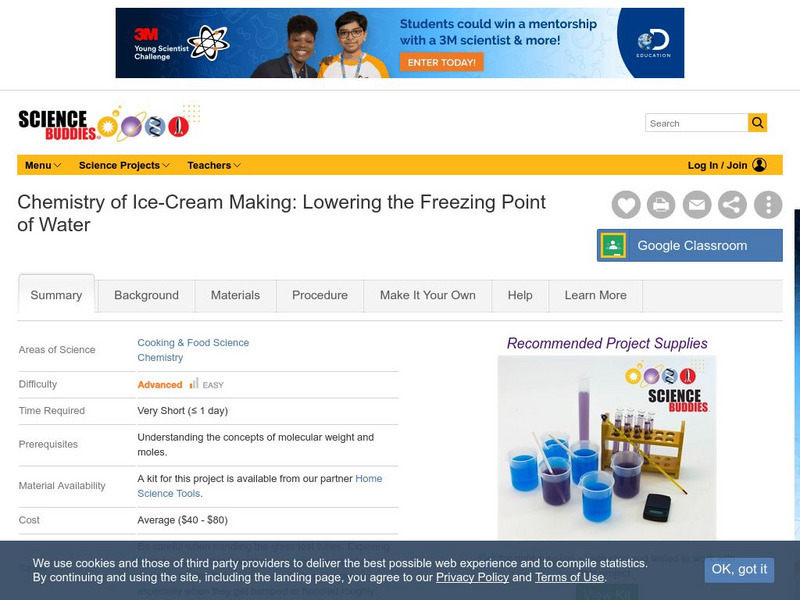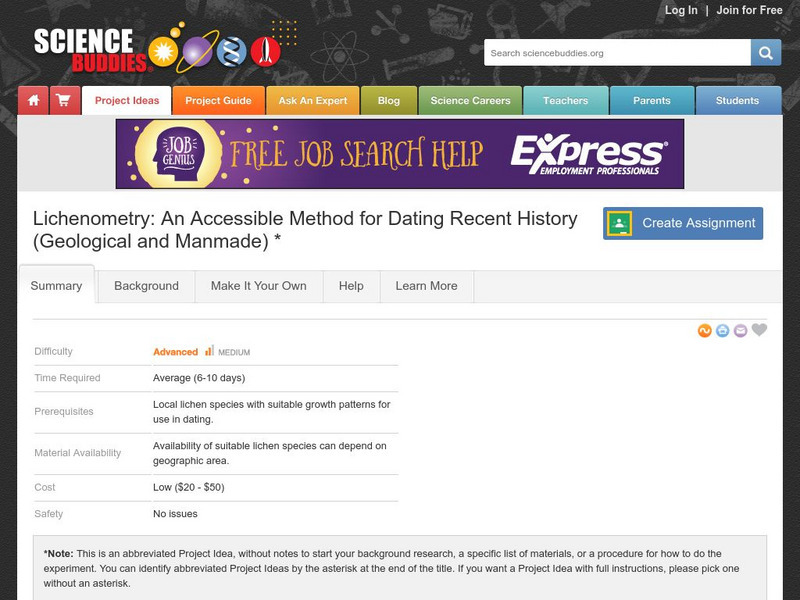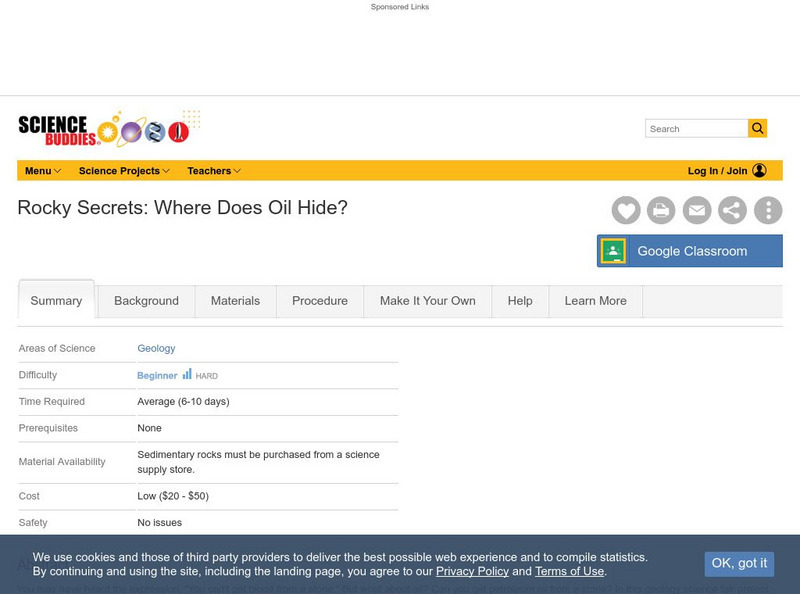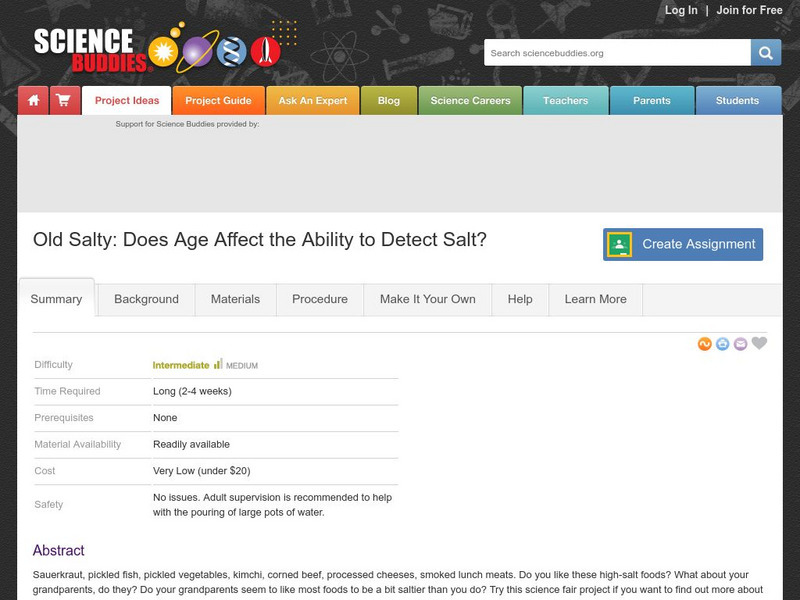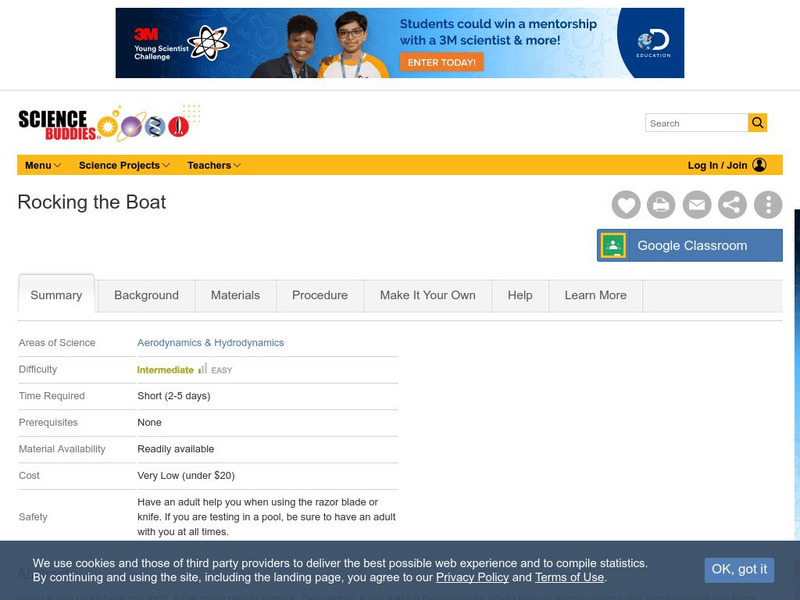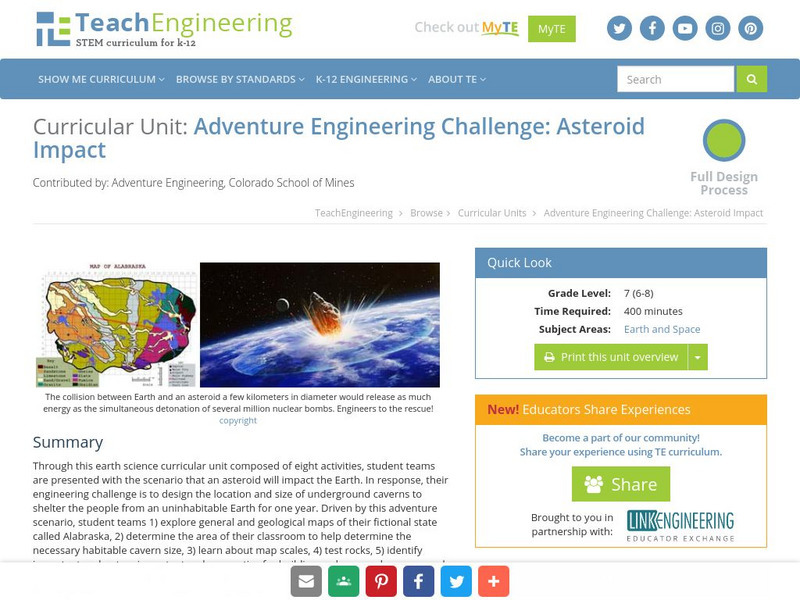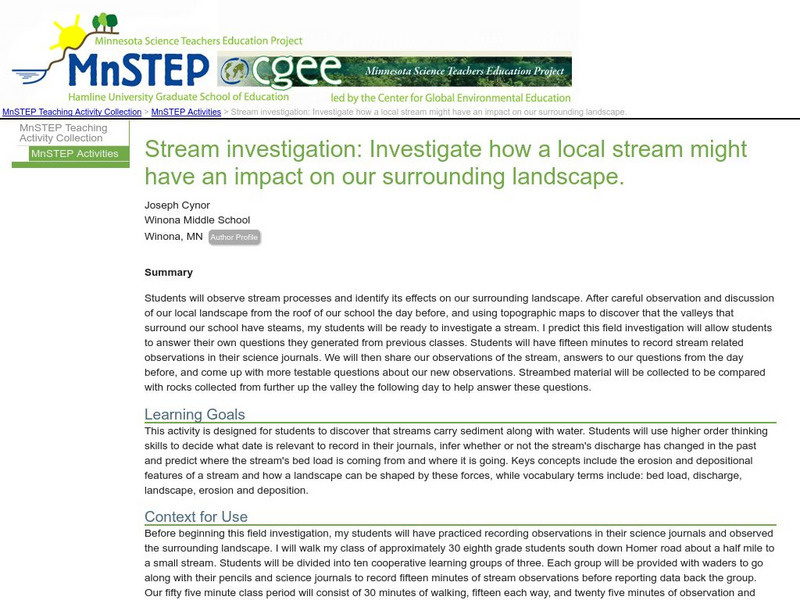Curated OER
Introduction to Ecology
Eighth graders identify the living and nonliving components of an ecosystem. In this ecology lesson, 8th graders explain the role each organism plays. They participate in class discussion and answer a quiz at the end of the lesson.
Curated OER
Technology-Supported Lesson Template
Students identify the major elements of a culture and the importance of religion in it.
Curated OER
Milk and Dairy Test
Students explore how to select and prepare milk and milk products, identify standard serving size for milk and milk products, review terms associated with milk and milk products, and demonstrate knowledge of how to use and care for these...
Curated OER
Everyone can explore architecture
Students draw like an architect. In this interdisciplinary lesson, students research and draw several examples of different forms of architecture through societies, cultures and times, then present them to the class.
Science Buddies
Science Buddies: Lowering the Freezing Point of Water
When it comes to making ice cream, in order to make the mixture cold enough to freeze, you surround the container with ice and rock salt. This experiment helps you learn how the addition of salt (or other substances) affects the freezing...
Science Buddies
Science Buddies: When Science Is Sweet: Growing Rock Candy Crystals
Though rock candy seems to be a simple enough treat, it is also pretty interesting to make. Crystallized sugar that can be grown from a sugar-water solution is just how rock candy is made. In this experiment, you will learn to make your...
Science Buddies
Science Buddies: Porosity and Particle Size
Often, when we think of something that is solid we think about rocks. But in reality, rocks have tiny holes of air inside them. This is called porosity. In this experiment you can find out what it means to be "solid as a rock."
Science Buddies
Science Buddies: Rock On! Recording Digital Data With Magnets
This is a straightforward project that shows you how data can be digitized and stored on magnetic recording media. You'll learn how alpha-numeric characters are digitized, and you'll use bar magnets to represent the individual data...
Science Buddies
Science Buddies: Lichenometry: An Accessible Method for Dating Recent History
Geology and archeology are examples of historical sciences. Their practitioners rely on multiple methods for establishing dates and temporal sequences as they seek to construct a history from the available evidence. This project will...
Science Buddies
Science Buddies: Rocky Secrets: Where Does Oil Hide?
You may have heard the expression, "You can't get blood from a stone." But what about oil? Can you get petroleum oil from a stone? In this geology science fair project, you'll find out what kinds of stones make the best storage rocks for...
Science Buddies
Science Buddies: Old Salty: Does Age Affect the Ability to Detect Salt?
Sauerkraut, pickled fish, pickled vegetables, kimchi, corned beef, processed cheeses, smoked lunch meats. Do you like these high-salt foods? What about your grandparents, do they? Do your grandparents seem to like most foods to be a bit...
Cornell Lab of Ornithology
Habitat Network: Rock Walls and Piles
Find out how to use rocks and other features to maximize growth in a garden.
Science Buddies
Science Buddies: Rocking the Boat
Become an engineer for a day and discover the best way to keep from rocking the boat in this engineering science fair project. When a ship rocks back and forth, it can make people seasick, but also it makes it dangerous for jets to land...
Science Buddies
Science Buddies: Sorting Out Sedimentation
Sedimentary rock forms in layers that are deposited one after the other over long periods of time. Oftentimes, sedimentary rock contains fossils and other debris that are deposited within the layers. Use this experiment to investigate...
ArtsNow
Arts Now Learning: Grade 3: Rock N Art
In this arts integrated unit, 3rd graders will explore Rocks and Soil. These projects focus on bringing multiple art forms to the Earth Sciences for third graders. Students will focus on comparing and contrasting the 3 types of rocks, as...
American Geosciences Institute
American Geosciences Institute: Earth Science Week: The Earth Trek Gravestone Project
The Gravestone Project, part of the global citizen science program called EarthTrek, seeks volunteers to visit cemeteries around the world and collect scientific data on how marble gravestones are weathering.
Alabama Learning Exchange
Alex: The Birth of Rock(s) Identifying Rock Types
This lesson will allow the student to explore the characteristics of rocks. Through exploration the student will be able to identity the three kinds of rocks and examples of each. They will also learn how rocks are used in our...
Alabama Learning Exchange
Alex: The Rockin' Rock Cycle Igneous Rocks
In this lesson, students will be given a brief overview of the rock cycle. Students will then focus on igneous rocks and how they are formed. This lesson plan was created as a result of the Girls Engaged in Math and Science, GEMS Project...
Alabama Learning Exchange
Alex: The Rockin' Rock Cycle: Metamorphic Rocks
The rock cycle consists of igneous, sedimentary, and metamorphic rocks. This lesson will focus on metamorphic rocks and how they form. This lesson plan was created as a result of the Girls Engaged in Math and Science, GEMS Project funded...
American Museum of Natural History
American Museum of Natural History: O Logy: Stuff to Do: Buried Bones
A how-to science project with instructions to make a complete dinosaur bone dig site burying chicken bones in plaster of Paris. Click on the starred words to learn more about the topic.
Alabama Learning Exchange
Alex: Rock Steady
Students use their knowledge of the rock cycle to write a story about a pet rock. The story must include the rock changing from magma, to each type of rock igneous, sedimentary, and metamorphic. The story should end with the pet rock...
TeachEngineering
Teach Engineering: Asteroid Impact
Asteroid Impact is an 8-10 class long (350-450 min) earth science curricular unit where student teams are posed with the scenario that an asteroid will impact earth. They must design the location and size of underground caverns to save...
Science Education Resource Center at Carleton College
Serc: Mn Step: Stream Investigation
This is a field study where young scholars investigate the characteristics and processes of local streams to see how they affect the landscape around them, and develop questions that could be investigated. They also collect rock samples...
Alabama Learning Exchange
Alex: Probability
The purpose of this lesson is to begin the process of helping learners to learn the basic principles of probability. The students will also collect data, interpret data, and determine the fairness of the game rock, paper, scissors.This...






